Lloyd’s Register and the University Maritime Advisory Services published their latest assessment of the current and future fuels available to shipping to help define the optimum solutions as the maritime industry seeks to reduce greenhouse gas emissions. The study was supported by the Methanol Institute.
This builds on research already undertaken by LR and UMAS into zero-emission vessels (ZEVs) and potential transition pathways to decarbonization.
Technologically possible in next few years, but ...
The study illustrates that regardless of which zero-carbon fuels emerge as favored options from an economic perspective, from an on-board technology perspective, ZEVs are likely to be technologically possible in the next few years. However, for owners and operators to be confident of future investments, the industry will require confidence in the wider community around the fuel supply chain, both in the availability of the quantities required and the land-based infrastructure for production, supply and distribution.
The assessment of technology readiness for the various zero-carbon solutions also provides insight into the current barriers to market uptake, with screening and assessment undertaken on a fuel-agnostic basis to help the industry identify opportunities for new approaches. The scope includes on-board procedures for bunkering, on-board storage, processing, conversion and propulsion.
Price scenarios, ship-specific case studies
Assessment of investment readiness includes energy source price scenarios, ship-specific case studies, total cost of operation, fuel-related voyage costs, impact on cargo carrying capacity and a sensitivity analysis.
Also considered were lifecycle emissions and the evolution of the energy landscape in other sectors to provide the context of the wider energy and industrial sectors.
'This paper is the next chapter of our low carbon series, following "Zero-Emission Vessels: Transition Pathways," published in January 2019. Our work with the Methanol Institute and UMAS is designed to help industry stakeholders to understand the dynamics and interactions between technology, investment and community readiness within the wider range of ship types, sizes and operational profiles,' said Katharine Palmer, global sustainability manager, Lloyd’s Register.
Substantial and collaborative effort required
The report, she added, reinforces that decarbonization of the shipping sector requires 'substantial and collaborative effort by maritime and energy stakeholders and beyond.'
For his part, Chris Chatterton, COO, the Methanol Institute, cited a 'need for unbiased, high quality research that presents the alternatives side by side, so that owners can work with all relevant stakeholders to investigate the right solution for their fleets. We’re pleased that this report recognizes the role that methanol has to play in shipping’s transition to a low carbon economy and ultimately as a net zero carbon fuel.'
Carlo Raucci, principal consultant, UMAS, stressed the importance of using a holistic approach when assessing the fuel choice for the decarbonization of shipping. The answer to 'What will be the future fuel for shipping?’, he added, will require further research and analysis and this paper 'provides an important contribution in answering that question.'
The report can be downloaded here.
Copyright © 2024. All rights reserved. Seatrade, a trading name of Informa Markets (UK) Limited.
Add Seatrade Cruise News to your Google News feed.  |

